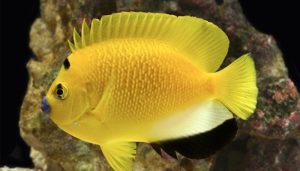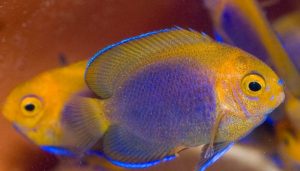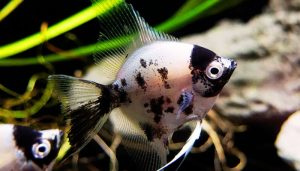Can mollies eat tropical fish food? Are you interested in getting a molly fish as a pet but need help figuring out what to feed it? You may be curious if mollies can eat tropical fish food.
Mollies are a widespread freshwater fish, but what can they eat, and what food is best for them?
The good news is that mollies can consume most of the different tropical fish foods available on the market, though certain ingredients should be avoided or limited.
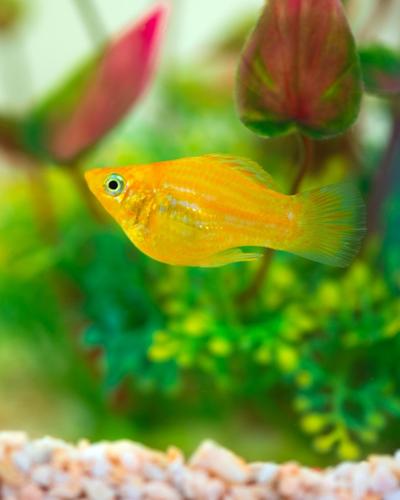
Many people who keep tropical freshwater fish don’t know what to feed their fish. This can lead to malnutrition and even death in some cases.
In this blog post, we’ll explain why these fish are so commonly kept as pets, detail the seven best food types, and answer all your other questions related to feeding your pet fish. Keep reading to learn more!
Table of Contents
ToggleAre Mollies Considered Tropical Fish?
Are mollies tropical fish? Yes, they are! Mollies are a species of tropical fish originating from Central and South America. They prefer warm water temperatures between 74 – 82 degrees Fahrenheit (23- 28 degrees Celsius).
They also need an aquarium with plenty of hiding spots, caves, and aquatic plants to provide them with shelter and security. When well-cared for, mollies can live anywhere from 2-5 years.
Mollies are considered very hardy fish and show no signs of disease or stress when kept in the right environment. They get along well with other peaceful species and make excellent community tank additions.
What Kind of Fish Food Do Mollies Eat?
What do mollies eat? Mollies consume whatever they get. They will eat everything you put in them, even dead animal products.
The best Fish Food For Mollies includes high-quality flakes, pellets, and freeze-dried foods like bloodworms and brine shrimp.
Live foods such as blackworms are also a good choice for mollies.When it comes to flakes, look for ones explicitly made for mollies or freshwater.
TOP 7 Best Food for Molly Fish: (Molly Fish Food List)
Generally speaking, your Mollies need a healthy diet. There is a wide variety of food options available. Having nutrient-rich diets is essential in mobile shopping. The best Fish Food For Mollies is shown in this list.
Molly Fish Food Pellets
Molly fish food pellets are a great way to give your mollies nutrients in an easy-to-eat form. These pellets are specially formulated to provide balanced nutrition and contain essential vitamins and minerals.
Hikari Molly Food
Similarly to other Hikari fish foods, these meals are formulated with A2 ingredients which are considered for the highest health of each fish species. This brand’s products are highly reliable and provide high-end food for animals that promote the health of aquatic pets.
This option does not affect aquarium water in any manner. This option is fantastic to observe. Since most animals enjoy eating these food sources, they produce little to no waste. It can not be used because it has no dangerous germs or parasites that are toxic.
Omega One Mini Color Pellets – Best Overall
This slow-sinking mini pellet will help you improve the color of the mole. They include high levels of beta carotenes and salmon skin, which may increase the color of oranges and red mollies and essential fatty acids for molly fish’s immune system.
Despite its lower starch content, the pellet is small enough to give molly food and doesn’t efficiently cloud water. Unlike most fish products, these pellets remain frozen in the ocean for a minute.
TetraMin Tropical Granules – Premium Choice
This fish meal is suitable for the molly fish because it is economical and carries an adequate supply of nutrients. These granule mollusks are tiny, easy to eat and sink slowly in aquariums.
This Tetra formula includes Vitamin C and other valuable vitamins for mollies. The one downside to the diet is its rapid dissolution in water, which could result in brackish water clouding problems.
API Fish Food Flakes
This product is considered a top-rated marble mill meal since its ingredients are essential for a balanced and comprehensive diet that will benefit the tropical fish community.
Following these principles provides aquatic species with a more easily consumed nutrient that can result in cleaner tank water conditions.
They can help you invest as they contain many nutrients. They contain beet pulp and spirulina and are adept in significantly strengthening different fish’s natural vivid colors.
Tetra Freeze-Dried Bloodworms
These treats contain plenty of protein to feed molly fish additional nutritional support.
It consists of freeze-dried mollusks and is rich in nutrients that are advisable in conjunction with other staple foods, such as algae wafers, if your molly needs a protein boost.
This food can also be good for mollies and babies. The high protein levels make mollies grow from molly fry tanks to adult fish tanks. The supplement must be taken at least twice a day.
Cultured foods
I prefer brine shrimp as an easy-feeding food for my mollusks. This is an attractive food for both mollies and adults. The sultanium is highly protein-rich and is accessible for cultivation.
The brine shrimp culture can be made at home using hatchery kits or brine shrimp eggs. It takes three days to hatch, and fresh-hatched brine shrimp can be fed in several hatcheries.
Daphnis also have health benefits and are easily cultivated at home. It needs feeding with yeast and bacteria and prefers warmer water temperatures of 18 – 22 degrees Celsius (61-672 degrees Celsius).
Can Mollies Eat Tropical Fish Food?
Yes, mollies can eat tropical food. In the wild, they are known to consume any vegetation and algae found in their natural habitats, including terrestrial and aquatic options that vary greatly depending on their geographical locale.
Regarding low food, mollies mainly feed on fruits like papayas and mangos; vegetables like squash and kale.
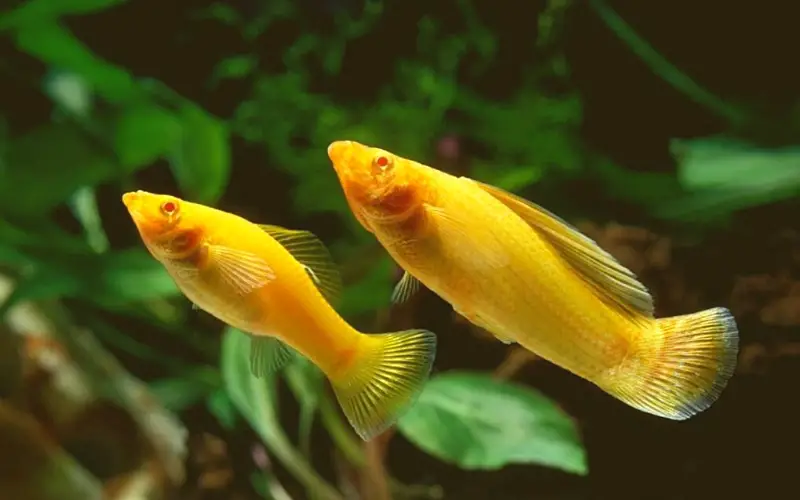
Nuts like almonds and cashews, grains such as quinoa or barley, various types of protein-rich foods such as shrimp, clams, and mussels, as well as other insects.
They will also take advantage of nearby plants’ available flowers or seeds. Overall it is important to remember that these omnivorous fish should be given a balanced diet for proper health maintenance.
Mixing the different food sources is best, so your molly can stay energized with their food choices over time.
What to Look for When Buying Molly Fish Food?
When looking for suitable molly food, several factors should be considered.
Check whether the item includes spirulina or dietary supplements since it provides excellent nutritional value and dietary fiber.
Look for alternatives that use worm and shrimp products, such as blackworms. Since fish species are omnivores, they often consume plants in general.
When they reside in an aquarium, they must eat different vegetables and good-quality flakes. The flakes should have all the necessary minerals and vitamins for proper growth.
Check out brands that offer color-enhancing food as it enhances the molly’s natural c
It is also essential to check for nutritional content such as omega-3 fatty acids, calcium, and phosphorus levels to provide your fish with balanced nutrition.
Finally, ensure the food is free from artificial preservatives and colorants to maintain a healthy diet.
Can You Feed Mollies Tropical Fish Flakes?
Can molly fish eat tropical flakes? Yes, mollies can eat tropical fish flakes. Tropical flake foods are a type of dry food specifically formulated for the needs of tropical aquarium fish.
These specialized foods usually contain higher levels of fats and proteins than other types of fish diets, which help meet the specific dietary needs of tropical species.
The flakes also provide a balanced source of vitamins, minerals, and micronutrients.
To ensure the optimal health of your mollies, it is always best to supplement their diet with live or frozen foods like bloodworms every once in a while.
Overall, tropical flake food is an excellent source of nutrition for mollies and can provide them with the nutrients they need to stay healthy adult molly fish.
What Can You Feed Tropical Fish Besides Fish Food?
In addition to the fish diet, various other foods can be fed to mollies’ fish. Live or frozen foods like bloodworms, brine shrimp, and blackworms are all good sources of nutrition for tropical fish.
Fruits such as apples or grapes can also be used, as they provide a natural source of vitamins and minerals.
Vegetables like spinach and peas should also be included in the diet, as they provide dietary fiber and essential nutrients.
Fish owners can also feed their natural fish foods such as small insects, worms, or various cultured foods. These can all provide essential nutrients that fish need for proper health maintenance.
By providing a variety of nutritious food sources, you can ensure that your tropical fish stay healthy and active for years to come.
What Vegetables Do Mollies Eat?
Molly fish loves a variety of vegetables, such as blanched zucchini medallions and cucumber slices.
If you’re short on time but want to ensure your molly gets their fill of plant matter, spirulina-based pellets or flakes make for the perfect meal replacement.
Vegetables like spinach, kale, and peas should also be included in molly’s diet. These vegetables provide essential nutrients, dietary fiber, and antioxidants that help keep your mollies healthy and energized.
Some other vegetables that adult mollies enjoy include various types of lettuce (e.g., romaine, butterhead, and iceberg), sweet potatoes, squash, carrots, celery stalks, bell peppers, and green beans. Be sure to blanch or steam these vegetables before feeding them to your mollies.
Overall, providing a variety of nutritious vegetables can help meet the dietary needs of your fish and keep them healthy for a long time.
Therefore, it is vital to offer a balanced mix of dry and wet food to mollies to ensure they receive all the necessary nutrients and vitamins for proper growth.
Can Mollies Eat Tetra Flakes?
Yes, mollies can eat Tetra flakes. Tetra flakes are a type of dry food specifically formulated for the needs of tropical aquarium fish.
These flakes balance fats, proteins, carbohydrates, vitamins, minerals, and other essential micronutrients.
Tetra flakes are an excellent source of nutrition for mollies and can provide them with the nutrients they need to stay healthy and active.
Can Mollies Eat Goldfish Flakes?
Can mollies eat goldfish food? Yes, mollies can eat goldfish flakes. Goldfish flakes are a good choice for mollies as they can provide the nutrients they need to stay healthy and active.
These specialized foods usually contain higher levels of proteins and carbohydrates than other fish foods, which helps meet the specific dietary needs of cold water species.
The flakes also provide an excellent source of vitamins, minerals, and other essential micronutrients.
As with any dry food, it is essential to supplement their diet with live or frozen foods like bloodworms, brine shrimp, or blackworms to provide them with the full range of vitamins and minerals they need.
Can Molly Fish Eat Betta Food?
Can mollies eat betta food? Yes, mollies can indeed eat betta food. They are omnivores, so they will happily feed on a variety of proteins, vegetables, and even sometimes algae.
Bettas food is mainly composed of insect larvae and other foods high in proteins, making it an excellent choice for mollies.
However, like all fish species, mollies require a diverse diet to stay healthy and thrive. While they may enjoy the occasional bite of betta food, it should not be their only source of sustenance as that could lead to dietary imbalances and deficiencies.
To ensure optimal health and well-being, provide them with an appropriate mix of high-protein flakes or pellets supplemented by live foods such as bloodworms or baby brine shrimp to provide variety!
Best Food for Molly Fry
Molly fry is tiny and requires a protein diet to provide the necessary energy for growth and development.
You can feed molly fry various dry food such as specially formulated fry pellets or flakes.
These types of food are small enough for the molly fry to consume and provide them with the nutrients they need.
The Best Food for Molly and Guppy Fish
Guppy and molly fish need a balanced diet that provides all the essential nutrients, vitamins, minerals, and other micronutrients required to stay healthy.
One of the best food sources for guppy and molly fish is live or frozen foods such as bloodworms, brine shrimp, or blackworms.
These foods provide a variety of proteins, vitamins, and minerals that help meet the fish’s dietary needs.
In addition to live or frozen food, guppy and molly fish should be fed a mix of high-quality, nutrient-rich pellets or flakes.
These dry foods also contain essential micronutrients, fats, proteins, carbohydrates, vitamins, and minerals.
Supplementing the diet with fruits and vegetables such as lettuce, sweet potatoes, squash, carrots, celery stalks, bell peppers, and green beans can also provide beneficial nutrients for your fish.
Be sure to blanch or steam these items before feeding them to your mollies and guppies.
Can Mollies Eat Brine Shrimp?
Yes, mollies can eat brine shrimp. They are an omnivore species and have an extensive diet that includes both plants and animals.
Brine shrimps are rich in proteins, fats, and nutrients that provide vital energy to the molly fish.
In addition to being a good food source, baby brine shrimp also help maintain the pH balance of your aquarium water by consuming excess waste products like ammonia and nitrites, which helps keep the water clean and healthy for your fish.
Best Homemade Foods for Molly Fish
Homemade foods can be a great addition to your molly’s diet. Here are some of the best human foods for mollies:
• Boiled veggies – Vegetables like carrots, squash, and sweet potatoes can provide essential vitamins and minerals for your fish. Be sure to boil them before feeding them to your mollies.
• Boiled eggs – Boiled eggs provide a great source of proteins and fats for your mollies and are easy to prepare.
• Fruit smoothie – Fruits like bananas, apples, pears, berries, and mangos can be blended with water to make a nutritious smoothie for your fish.
• Fish flakes – You can also make your flake foods to provide a nutrient-rich, balanced diet for your mollies with the right combination of proteins, fats, carbohydrates, vitamins, and minerals.
These homemade foods should be served in small pieces alongside other high-quality pellets or flakes to ensure your molly fish gets all the vitamins and minerals needed for optimal health.
Also, supplement their diet with occasional treats like bloodworms or brine shrimp.
You can ensure that your mollies stay healthy and happy by providing a balanced diet and plenty of variety!
Feeding Live Foods To Mollies
Mollies are omnivorous fish, meaning they can eat both plants and animals. Due to their omnivorous nature, mollies feed primarily on algae, insects, and small crustaceans like brine shrimps or bloodworms in the wild.
In captivity, you can provide your molly with live food to supplement its diet of pellets or flakes.
Live foods are an excellent source of protein and nutrients that can help meet your molly’s dietary needs while providing them with some enrichment.
You should feed live food in moderation, as too much can unbalance their diet. Also, you should be aware of the risk of introducing parasites into the fish tank by using live foods.
The best way to ensure your molly gets the nutrition it needs is by providing live food with high-quality, nutrient-rich pellets or flakes. This will help provide a balanced diet that meets their dietary needs.
Commonly Asked Questions about What Molly Fish Eat (FAQ)
Can Mollies Eat Peas?
Yes, mollies can eat peas. They are a great source of vitamins, minerals, and other nutrients your fish needs for optimal health. However, it would help if you only fed them blanched or steamed peas to avoid digestive problems.
Can Mollies Eat Tetramin Tropical Flakes?
Yes, mollies can eat TetraMin Tropical Flakes. This food is an excellent source of proteins, vitamins, and minerals that will provide your fish with all the nutrients they need to stay healthy.
Can Mollies Eat Bloodworms?
Yes, mollies can eat bloodworms. They are an excellent source of proteins, fats, and vitamins that can supplement your fish’s diet with essential nutrients.
Can Mollies Eat Glofish Food?
Yes, mollies can eat GloFish Food. This food is specifically designed for tropical fish like mollies and provides them with all the vitamins and minerals they need for optimal health.
How Many Times Should I Feed My Molly Fish?
It would be best if you fed your molly fish two or three times a day. To ensure they get all the vitamins and nutrients they need, you should provide them with various foods, including pellets, quality flake food, and occasional live food treats.
Can Mollies Eat Pellets?
Yes, mollies can eat pellets. They are an excellent source of proteins, fats, carbohydrates, vitamins, and minerals that will provide your fish with all the nutrients needed for a balanced diet. Pellets should make up the bulk of your molly’s dietary intake, supplemented with occasional treats of live food.
Can Mollies Eat Fruits?
Yes, mollies can eat fruits. Fruits like apples, melons, and oranges are a great source of vitamins and minerals your fish needs for optimal health. However, it would help if you only fed them in small amounts as too much can unbalance their diet.
Can Mollies Eat Algae?
Yes, mollies can eat algae. Algae is an excellent source of vitamins and minerals your fish needs for optimal health. You can provide them with algae wafers or let them graze on the natural algae in your tank.
Can Mollies Eat Tetra Food?
Yes, mollies can eat Tetra Food. This food is specifically designed for tropical fish like mollies and provides them with all the vitamins and minerals they need for optimal health.
Can Mollies Eat Bananas?
Yes, mollies can eat bananas. Bananas are a great source of vitamins and minerals that your fish needs for optimal health. However, feeding them in small amounts would be best as too much can unbalance their diet.
What Human Food Can Molly Fish Eat?
Mollies can eat various human foods, including cooked vegetables like peas and potatoes. However, it would help if you only fed them in small amounts as too much can unbalance their diet.
What types of fish can eat glofish flakes?
Most small to medium tropical fish can enjoy GloFish flakes, including tetras, barbs, bettas, and even bottom feeders like GloFish sharks with sinking wafer options available.
Can molly fish eat goldfish food?
Technically, yes, molly fish can eat goldfish food in a pinch. However, it’s not ideal for their long-term health. Goldfish food is higher in carbohydrates and fats, which aren’t essential nutrients for molly fish, who are omnivores needing a balanced diet rich in protein and plant matter. Feeding them primarily goldfish food could lead to nutritional deficiencies and health problems.
Conclusion
So, can mollies eat tropical fish food? It’s generally not a good idea to feed tropical fish food to Mollies. While they can technically eat it, the high protein content isn’t ideal for them and could lead to health problems. If you’re looking for quality food to feed your Mollie, we recommend checking out our online store. We have a variety of foods that are specifically tailored to meet their nutritional needs. Thanks for reading, and we hope this was helpful to mollies feeding schedule!
You might also like
- How to Tell If a Molly Fish Is Dying? (5 Fish Sick Symptoms)
- What Are Black and Yellow Molly Fish? (A Complete Guide)
- Can Mollies and Guppies Live Together peacefully? (Solved)
- Breeding of Molly Fish: 5 Successful Tips (For Beginners)
- Molly Fish Life span: Expert Tank Set Up & Beginner’s Guide
- Mollies Fish Tank Mates: 9 Peaceful Companions List (Proven)
- Balloon Mollies Fish: The Only Guide You’ll Ever Need (FAQ)
- Can Molly Fish Live with Goldfish Peacefully: The Shocking Truth!
- Goldfish with Molly Fish: Beware! The #1 Risk to Tank Bliss
- Are Black Mollies Bottom Feeders: (The Shocking Truth)
- Betta and Molly Fish Living Together: (Tips and Pros/cons)
- Do Molly Fish Eat Shrimp: A Comprehensive Compatibility Guide!


